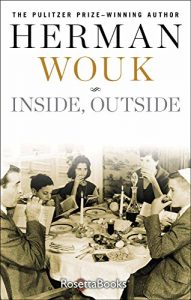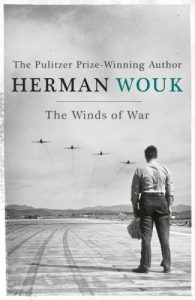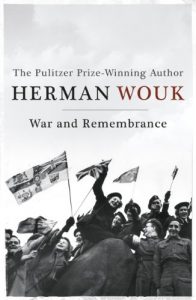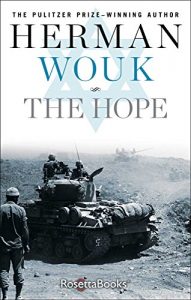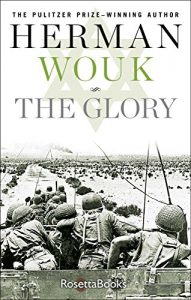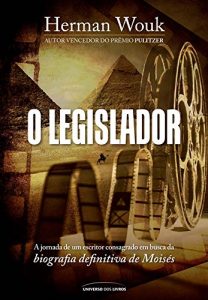From Pulitzer Prize–winning American author Herman Wouk, Inside, Outside is a rich and compelling story—beautifully focused and often hilarious…
Israel David Goodkind is a minor bureaucrat in the Nixon White House, killing empty office time by writing the story of four generations of his large, sprawling Russian-Jewish immigrant family. As he recounts his brief stint in show business, his torrid affair with a showgirl, and his encounters with a hassled and distracted President Nixon, Goodkind also witnesses historical events firsthand—the Watergate scandal, the Yom Kippur War—and eventually finds his way back to his Jewish faith.
Combining Wouk’s wildly funny streak with deeply religious passages—and some intensely intimate romantic scenes rare in this reticent author’s work—Inside, Outside is a striking departure from the traditional storytelling mode in which the author has won international fame; and yet it may be the most truly characteristic of all his writings. Written in the first person in a free-form, often ribald style, playing antic tricks with time, it offers all the passion, depth, historical detail, and humor that has made Wouk a bestselling author around the world.
Herman Wouk is one of the most widely-read American authors in the world. His books have been translated into 27 languages, and many of his works have become best sellers. He is perhaps best known for The Winds of War and War and Remembrance, an exhaustively-researched two-part historical series telling the story of World War II from the perspective of two fictional families whose lives were irrevocably changed by the war and the Holocaust. Sixteen years in the making, the epic involved extensive archival research including travel for research to England, Germany, Italy, Poland, and Israel. The Winds of War and War and Remembrance were adapted for television in a thirty-hour series that won the 1989 Emmy Award for Outstanding Miniseries and was, according to ABC, “the most watched television show in history.”
Born in New York City to Russian-Jewish parents, Wouk graduated from Columbia University and started out working as a comedy writer for Fred Allen’s radio show. After the attack on Pearl Harbor in December 1941, he joined the Navy, serving in eight Pacific invasions and earning several battle stars. During his service in the Pacific he had turned to writing, like Lieutenant Keefer in The Caine Mutiny, for an hour or two before dawn. After his discharge in 1946, Wouk finished his first novel, which became a Book-of-the-Month Club selection, and he soon followed up with the international best sellers The Caine Mutiny, and Marjorie Morningstar.
Wouk won the 1952 Pulitzer Prize for fiction for The Caine Mutiny. He has also been awarded numerous academic honors, including a degree from the Hebrew University in Jerusalem. In January 2001, UC San Diego established the Herman Wouk Chair of Modern Jewish Studies, and in 2008 he was given the first Library of Congress Lifetime Achievement Award for the Writing of Fiction.
Israel David Goodkind is a minor bureaucrat in the Nixon White House, killing empty office time by writing the story of four generations of his large, sprawling Russian-Jewish immigrant family. As he recounts his brief stint in show business, his torrid affair with a showgirl, and his encounters with a hassled and distracted President Nixon, Goodkind also witnesses historical events firsthand—the Watergate scandal, the Yom Kippur War—and eventually finds his way back to his Jewish faith.
Combining Wouk’s wildly funny streak with deeply religious passages—and some intensely intimate romantic scenes rare in this reticent author’s work—Inside, Outside is a striking departure from the traditional storytelling mode in which the author has won international fame; and yet it may be the most truly characteristic of all his writings. Written in the first person in a free-form, often ribald style, playing antic tricks with time, it offers all the passion, depth, historical detail, and humor that has made Wouk a bestselling author around the world.
About the Author
Herman Wouk is one of the most widely-read American authors in the world. His books have been translated into 27 languages, and many of his works have become best sellers. He is perhaps best known for The Winds of War and War and Remembrance, an exhaustively-researched two-part historical series telling the story of World War II from the perspective of two fictional families whose lives were irrevocably changed by the war and the Holocaust. Sixteen years in the making, the epic involved extensive archival research including travel for research to England, Germany, Italy, Poland, and Israel. The Winds of War and War and Remembrance were adapted for television in a thirty-hour series that won the 1989 Emmy Award for Outstanding Miniseries and was, according to ABC, “the most watched television show in history.”
Born in New York City to Russian-Jewish parents, Wouk graduated from Columbia University and started out working as a comedy writer for Fred Allen’s radio show. After the attack on Pearl Harbor in December 1941, he joined the Navy, serving in eight Pacific invasions and earning several battle stars. During his service in the Pacific he had turned to writing, like Lieutenant Keefer in The Caine Mutiny, for an hour or two before dawn. After his discharge in 1946, Wouk finished his first novel, which became a Book-of-the-Month Club selection, and he soon followed up with the international best sellers The Caine Mutiny, and Marjorie Morningstar.
Wouk won the 1952 Pulitzer Prize for fiction for The Caine Mutiny. He has also been awarded numerous academic honors, including a degree from the Hebrew University in Jerusalem. In January 2001, UC San Diego established the Herman Wouk Chair of Modern Jewish Studies, and in 2008 he was given the first Library of Congress Lifetime Achievement Award for the Writing of Fiction.
